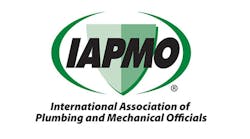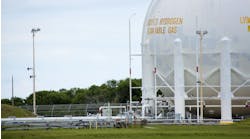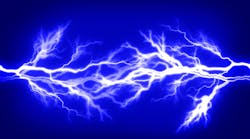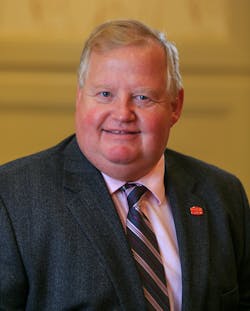CHARLOTTE, N.C.—PHCCCONNECT’s highly anticipated, and attended, Natural Gas Bans: Electrification and How It Will Impact Your Business session hosted by Mark Valentini, PHCC Director of Legislative Affairs and Chuck White, PHCC Vice President of Regulatory Affairs, did not disappoint. This in-depth discussion gave a state-by-state assessment of the regulatory impact and implications of electrification.
CONTRACTOR wanted to dig deeper into PHCC’s stance on electrification and potential push back on natural gas bans. After the presentation, we caught up with Chuck White to talk about this hot topic. Chuck monitors activities of Federal Agencies such as the Department of Labor, the Department of Energy and the Environmental Protection Agency, and meets regularly with other industry stakeholders in the codes and standards arena. He relies on more than 30 years of experience in plumbing and HVAC industry to represent PHCC member’s interests.
CONTRACTOR: Everyone is for sustainability and doing what they can for the environment, but when I spoke recently with PHCC Past President Joel Long, we talked about how eliminating energy choices might be seen as a debilitating and weakening economic move. Can you expound on this?
PHCC has promoted high efficiency products for clients when they are technically feasible and economically justified. PHCC Past President Long referred to the dangers of eliminating choices, which ties closely to the feasibility and economic justification of products. Moving to an all-electric energy supply makes a good sound bite but when one looks deeply into the situation, the power generation and grid infrastructure are not in place to totally provide renewable energy for the required load.
The dominant generator of electricity today is natural gas; it is more efficient to provide building heating loads through gas-fired appliances rather than produce the electricity and suffer the distribution power losses inherent in the grid. Lacking the renewable generation component and eliminating fossil fuel generation leaves a huge gap in electricity production.
The answer to this is “demand side initiatives,” which are fancy words for the utility managing their load by turning off the power to consumers. This could be overcome if sufficient generating capacity is developed, but that will take significant capital, whether it is federal money, investor funding or rate payer dollars.
The scope of the needed capital investment makes the Inflation Reduction Act (IRA) look like pocket change. Heat pumps are everyone’s answer, and yes, heat pumps will work, but they are not inexpensive and not trouble-free. At the end of the day, huge amounts of additional electricity will be needed, and in most cases heat pumps might approach the operating cost of natural gas but probably not be lower than natural gas.
CONTRACTOR: Can you give readers a sense of PHCC’s push back on natural gas bans?
WHITE: PHCC works though its state and local chapters to inform its members and their clients as to what de-carbonization really means. Most consumers hear the sound bites about efficiency and being good for the environment but don’t really understand what that means to them.
PHCC has attended public meetings, state and local chapter meetings, and gone to state legislatures to try and explain the realities of de-carbonization and electrification. The Association works with a coalition of various stakeholders to monitor activities, typically at a local level, and provide information to local members. At times, grassroots letter writing campaigns have been used to provide a voice to members and their clients in response to proposed legislation or regulation.
CONTRACTOR: During CONNECT, we heard a lot about regulations. What are PHCC’s main concerns when it comes to local, state and government regulations/legislation?
WHITE: Regulations are where the rubber meets the road. Regulations provide the interpretation and application of legislation, at times there can be a disconnect between the intent of the legislation and what the regulators think it means. Also, some jurisdictions have moved to sidestep the legislative process and simply change the building codes—a form of regulation—to achieve their electrification goals. Sometimes these code changes may not be an outright ban but could be a requirement to provide complete wiring systems for future electrification. Adding additional expense to a building project can tip the scale away from one energy source directly to another.
PHCC is concerned that these efforts to change code requirements really do not consider the true economic impact to consumers, whether it is increased construction costs, higher cost equipment and appliances, maintenance costs, or higher utility bills. Much of this work is not done in an open and transparent process, which can yield big surprises for consumers.
CONTRACTOR: How does all of this affect contractors?
WHITE: There are a variety of ways contractors could be affected, but one thing is for sure: If you don’t know about heat pumps, you better learn. PHCC contractors are plumbing and HVAC professionals; they have worked with heat pumps before. There have been good applications for heat pumps in the past. When it has made economic sense or a client really has wanted one, our members have stepped up. There will be more consumers asking for this equipment; in fact, there are jurisdictions where this either is or soon will be a reality. There will be significant federal money from the IRA to support these products, and contractors need to be ready to provide solutions for this market.
PHCC will continue to explain the flaws in the electrification model, push for professional installations, and be ready to help consumers maintain their climate comfort. Is this a path for contractors to make more money? I would say contractors better figure this out now so they don’t make a lot less money.



